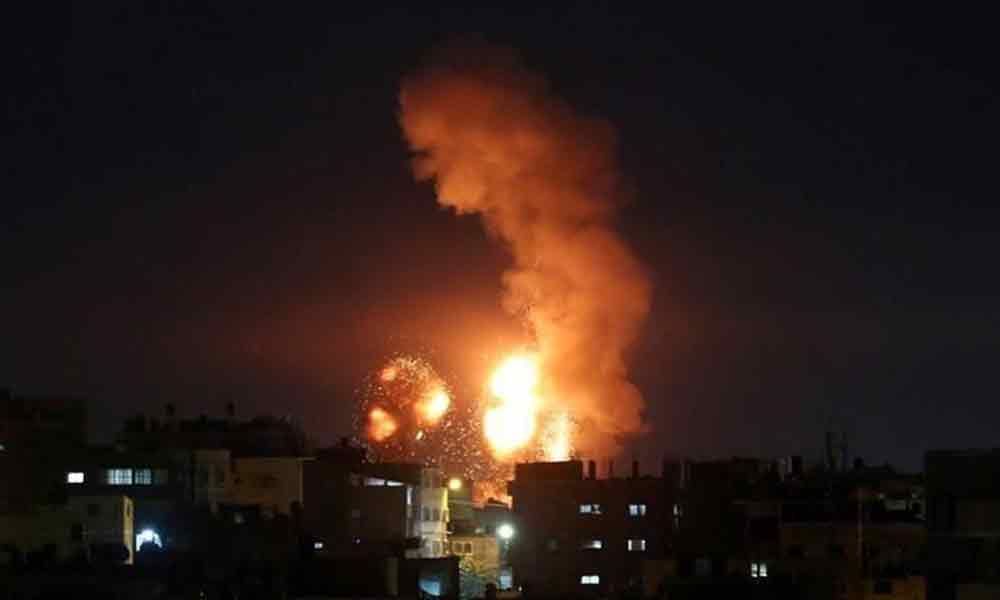After ceasefire comes into effect, army reveals it had struck observation posts, underground infrastructure and weapons caches throughout the Gaza Strip.
Israeli tanks and fighter jets, attack helicopters and other aircraft carried out strikes on roughly 100 Hamas targets throughout the Gaza Strip over the past three weeks, in response to rocket launches and airborne arson attacks by terror groups in the coastal enclave, the Israel Defense Forces said Tuesday.
The announcement came after Israel and Hamas reached a ceasefire agreement on Monday night, under which terrorists in the Strip halted the violence along the border and Israel reopened Gaza’s fishing zone and border crossings.
The military said the targets of its strikes included 20 observation posts, 30 tunnel openings and tunnel construction facilities, 35 munitions caches and weapon-manufacturing sites, 10 locations connected to Hamas’s aerial capabilities — both drones and anti-aircraft weaponry — and several sites used by its naval commando unit.
“These strikes represent significant damage to the military infrastructure and armaments of the Hamas terror group,” the IDF said in a statement.
Though the IDF reported on its near-nightly reprisal raids from August 12 to 30, the military did not reveal the specific targets of its strikes until Tuesday, after the ceasefire was announced.
The military also released footage of some of the strikes, as well as an illustrative map showing the approximate locations of the targets.
On Tuesday morning, IDF Spokesperson Hidai Zilberman credited the ceasefire to the military’s strikes on 100 Hamas targets, as well as concerns in Gaza about a growing coronavirus outbreak and the promise of Qatari aid money.
The Gaza ceasefire was brokered by Qatar, as well as the Egyptian military and the United Nations. It ended a nearly month-long round of low-level violence along the border.
Israel did not explicitly confirm the existence of an agreement, but tacitly acknowledged it by promising to reopen the fishing zone and crossings if calm was maintained.
“This decision will be tested on the ground: If Hamas, which is responsible for all actions that are taken in the Gaza Strip, fails to meet its obligations, Israel will act accordingly,” said Israel’s military liaison department to the Palestinians, known formally as the Coordinator of Government Activities in the Territories.
“The resumption of the civilian policy vis-à-vis the Gaza Strip is subject to the continuation of calm and security stability,” COGAT said.
The breakthrough in the negotiations came as the number of coronavirus cases in the beleaguered Palestinian enclave continued to rise by dozens each day, threatening another humanitarian crisis in an area that already lacks regular access to electricity and potable water.
Beginning on August 6, terrorists in the Strip began launching dozens of balloon-borne incendiary and explosive devices into southern Israel each day, sparking dozens of fires daily that burned many acres of Israeli land and caused a small amount of property damage.
Over the past week, sporadic rocket attacks have struck Gaza-adjacent communities, causing damage to homes and light injuries.
In response to the balloon attacks and the rockets, the IDF conducted regular strikes on Hamas sites in the Strip, bombing both above- and below-ground facilities, while refraining from hitting operatives.
On August 16, Israel also halted the transfer of all goods into the enclave, save for food and humanitarian aid, and barred Palestinians from fishing off the Gaza coast.
In a statement Monday night, Hamas noted that the agreement was brokered by Qatari envoy al-Emadi, who has been meeting regularly with Gazan and Israeli officials over the past week.
“As part of these efforts, a number of projects that serve our people in the Gaza Strip will be announced and contribute to alleviating our crises in light of the coronavirus wave that befell the Gaza Strip, as well as the return of the situation to the status quo,” Hamas said.
Al-Emadi was also expected to soon begin distributing the nearly $30 million he brought into the Strip, which will go to purchasing fuel, paying civil servants and helping Gaza’s poor.
Hamas and other terror groups in the Strip have demanded a total end of the blockade on the enclave in exchange for an end to hostilities. That request is unacceptable to Israel, which believes that such an open border would be used by terrorist organizations to bring large quantities of weapons into Gaza.
However, Israel has at times loosened its restrictions on what types of goods can enter the Strip.
The groups have also asked for new internationally funded infrastructure programs for the enclave.
Over the past two and a half years, Israel has engaged in 11 rounds of fighting with terror groups in the Strip.
(Times of Israel).
